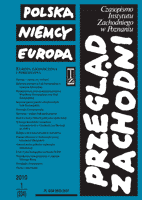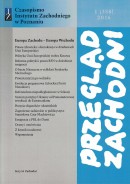Oceny i omówienia
Author(s): Danuta Jamiołkowska,Bohdan Gruchman,Mieczysław Stolarczyk,Marcin Piechocki,Michał Nowosielski,Witold Ostant,Stanisław Żerko / Language(s): Polish
/ Issue: 04/2006
Keywords: Polish history
Book Reviews
Joseph Ratzinger, Europa. Jej podwaliny dzisiaj i jutro (omów. Natalia Jackowska)
Jadwiga Kiwerska, Świat w latach 1989-2004. Wydarzenia – konflikty – procesy (omów. Witold Ostant)
Piotr Kalka, Rola RFN w rozwoju integracji ekonomicznej we Wspólnotach Europejskich (omów. Bohdan Gruchman)
Ryszard Zięba, Wspólna Polityka Zagraniczna i Bezpieczeństwa Unii Europejskiej; Ryszard Zięba, Europejska Polityka Bezpieczeństwa i Obrony (omów. Mieczysław Stolarczyk)
Populism and Media Democracy, Edited by Beata Ociepka (omów. Marcin Piechocki)
Tomasz Białek, Terroryzm. Manipulacja strachem (omów. Witold Ostant)
Elisabeth Noelle-Neumann, Spirala milczenia. Opinia publiczna – nasza skó ra społeczna (omów. Michał Nowosielski)
Nad Bałtykiem, Pregołą i Łyną. XVI-XX wiek. Księga Pamiątkowa poświęcona jubileuszowi 50-lecia pracy naukowej Profesora Janusza Jasińskiego, pod red. Zenony Rondomańskiej (omów. Danuta Jamiołkowska)
Die UdSSR und die deutsche Frage 1941-1948. Dokumente aus dem Archiv für Außenpolitik der Russischen Föderation, bearbeitet und herausgegeben von Jochen P. Laufer und Georgij P. Kynin unter Mitarbeit von Viktor Knoll. Band 1: 22. Juni 1941 bis 8. Mai 1945; Band 2: 9. Mai 1945 bis 3. Oktober 1946; Band 3: 6. Oktober 1946 bis 15. Juni 1948 (omów. Stanisław Żerko)
Information
Dzienniki czynności Prezydenta RP Władysława Raczkiewicza 1939-1947, t. I: 1939-1942, t. II: 1943-1947, oprac. Jacek Piotrowski (omów. Stanisław Żerko)
Manfred Alexander, Kleine Geschichte Polens (omów. Jerzy Kozeński)
More...


